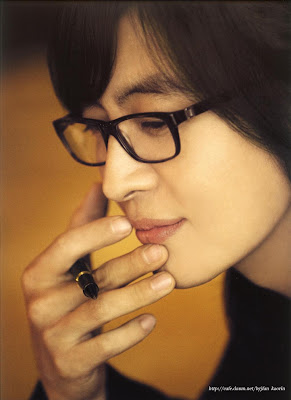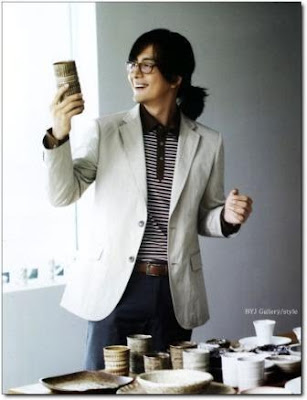Hi dear sisters ...... our handsome prince has been so quiet these days, huh? He's really staying away from the limelight and trying to restore his health. You know, when I read the interview that he gave to the Korea media right after the Tokyo Dome ‘Beauty of Korea’ Event, I got the impression of a very changed man. Yong Joon has become more assured of himself, more outspoken and definitely more aware of his influence on social issues. After spending an entire year researching his book and away from acting, this man seems to have found his calling in life and is earnestly steering his path in that direction.

Quoted from his interview :
"I once was interested in business, but now I am really not interested in it. I've concluded that business is not my way because I can't afford the constraints that it brings me. There are many things that I want to do instead. I don't know how long I will stay as an actor. After that, I would like to become a farmer, then a photographer, and then a ceramic artist."
While I am a bit taken aback by his candidness (and even a slight bit of naiveté) since he is undisputedly the top star in Asia and owner of a powerful entertainment conglomerate, but it’s quite understandable of where this is all coming from. When you think about Yong Joon had spent a whole good year traveling to remote mountains and villages of Korea in search of lost traditional arts. These extraordinary artisans he met not only possess rare talents and skills, but they also cultivate their own unique philosophy about life. Imagine after many nights of heart-to-heart exchange over tea/wine about topics on art, culture and life, Yong Joon must have been enthralled and immersed into this life of external simplicity and internal contentment. A year ago, he left us to search for worthy Korean sights to introduce to the world, now he came back being washed with the morning dews of nature himself.

More quotes from his interview :
“As I’ve written in my book, I think one must gain (i.e. learn) much in order to discard much when you go through the *Moo Moon Kwan 無門關*. One day, when I was contemplating on this subject at home, I felt that the furniture were the owner of the space, not me. That moment I thought, “Someday I should get rid of these things. I should reduce my possessions.” The time might come earlier than I expect. We don't become happier by having more, do we? I think we can stay happier when we live in a more simple way ..... when we feel something is missing. Nowadays, I am exercising on discarding things. (laugh)”
* Explanation of Moo Moon Kwan, 무문관, 無門關 :
It is a book written in Song Dynasty (China) by a monk named Jong So (종소, 宗紹), who recorded the preaches of his master Moo Moon Hye Gae (무문혜개, 無門嵆開). The full name of this book is SeonJong Moo Moon Kwan 선종무문관 (禪宗無門關). It contains 48 major themes that are important in Zen Buddhism. The meaning of '無 (none)' does not mean the opposite of '有 (being, existence)'. The '無' means the absolute level of recognition that one could reach ... one does not even discriminate '無' and '有' if he/she reaches there. The major theme of this book is the pursuance of that '無'.
In many cases, 무문관 also means studying hard in a temple to reach the level described above. YJ used this word in this meaning.*

I am particularly impressed with Yong Joon’s innocence, purity and courage in search of this state of Zen. In p.366 of his book, Yong Joon wrote :
“I once planned that if I build a Korean traditional house, I would go in there with lots of books, lock the door up, and study there for a long time. However, the surprising thing is, the Moo Moon Kwan requires one to go in without anything. No books, no belongings, just your body. I was disappointed. What shall I do without my books? I felt that I have a long way to go to reach that level. I have to learn more to discard myself.”
It’s coincidental that during my recent trip back to Canada (before the Tokyo Dome events), I looked around my house and was totally turned off by how much ‘stuffs’ I have accumulated over the years! By stuffs, I don’t mean anything valuable, but just boxes and piles of toys, books, old clothes, broken knick-knacks that you can’t even name, let alone categorize! Maybe during this move to Tokyo which we only brought along our daily clothes, books and computers (oh oh I almost forgot, I did transport all my treasured BYJ belongings everywhere with me :), that I realize how little possessions one really needs to live on. Our lives are more free and our hearts much lighter here, with minimal physical possessions (if we can resist the fantastic shopping here :) and simpler human relations (haha, maybe because we can’t communicate much). Following Yong Joon’s example, I hope to work on reducing, reusing and recycling most of my ‘stuffs’ when we return home. Achieving simplicity and internal contentment will require more than just discarding one’s physical possessions, but I feel having a calm and uncluttered environment does help to create the desirable atmosphere. Yong Joon ssi, you are a great inspiration, as always. Please take care of yourself and be happy.

source : Maeil Economy Star Today, reporter Cho Eun Yong
translated into English : gaulsan in Quilt, thanks.

 See, they're naturally long, ever since I was a barefooted youth.
See, they're naturally long, ever since I was a barefooted youth. People said I was so beautiful then (hehe, they'd no idea what was about to come :)
People said I was so beautiful then (hehe, they'd no idea what was about to come :)

























.jpg)























 Pictures from BYJGallery by style and daisukibyj
Pictures from BYJGallery by style and daisukibyj